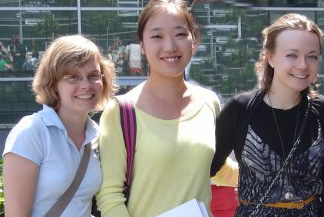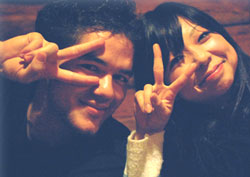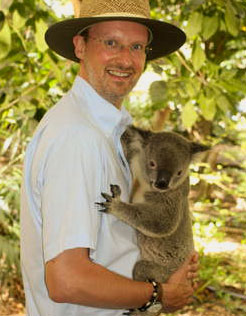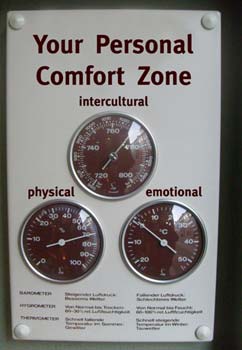Firefox users please try another browser so that you can access the audio player.
If you like the podcast then LIKE US ON FACEBOOK HERE!
Did you know that if you are a student in a European University you are able t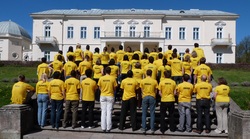 o take part in an intensive seminar with students and lecturers from all over the EU? We’ll be hearing from some students who took part in one such seminar in Lithuania earlier this year. Did you follow Karsten Kneese on Twitter last month? Karsten took over the ’I am Germany’ Twitter account for a week early in October. One thing I learnt about during that week was the German work canteens which are open to the public. So what do you think of this as a way of representing a country? You can add your comments to our blog here or on our Facebook page. Thank you An, Vian, Sammy, Katherine and Roman who are the latest to have liked us there.
o take part in an intensive seminar with students and lecturers from all over the EU? We’ll be hearing from some students who took part in one such seminar in Lithuania earlier this year. Did you follow Karsten Kneese on Twitter last month? Karsten took over the ’I am Germany’ Twitter account for a week early in October. One thing I learnt about during that week was the German work canteens which are open to the public. So what do you think of this as a way of representing a country? You can add your comments to our blog here or on our Facebook page. Thank you An, Vian, Sammy, Katherine and Roman who are the latest to have liked us there.
So in May, 35 students and lecturers from all over Europe gathered together in Lithuania to work together for two weeks on an intensive seminar about entrepreneurship called RECEIVE. The topics explored included marketing, intercultural differences, digital communication, coaching and critical thinking. Critical thinking not only has an application to entrepreneurs but is also an important skill for students who have been taught in quite a different way across the world.
absolutely critical
I talked first to Serge Koukpaki from Edinburgh University, which attracts many international students each year, about why he teaches a course on critical thinking and the effect on his foreign students. Then I talked to three of the students Serge brought with him to participate in the RECEIVE project who came from China, Thailand and Tanzania to find out what they thought of bringing a diverse group together to create joint products. Guangqian Li from China spoke about his experience of working in a multinational group. I was certainly surprised to learn that this intensive seminar in Lithuania was Li’s first experience of a truly multicultural educational setting. Didn’t he have that in Edinburgh I wondered? Next I spoke to Duanjam Surbpong or Mo for short from Thailand about the benefits of the Intensive programme; extending your network is certainly a useful entrepreneurial skill. My final interview was with Hassan Iddy, a teacher trainer from Tanzania who found that the communal living aspect of the project reminded him of life in Tanzania much more than in Edinburgh where he is currently studying for his Masters.
absolutely challenging
So far we’ve heard a lot of good things about the Receive project but there were also a few challenges. For example the group visited holocaust memorial museums while in Lithuania which lead to a discussion on genocide and the question about whether China’s one child policy could also be classed as genocide. For Li, whom we heard from earlier, this was a problem as he explains. And that wasn’t the only challenge. In my own workshop where we were constructing the project website, we suddenly noticed after about four days of work that all the personal photos on the website were of males. This was quite a shocking realization which lead us to review all the photos on the website as well as discussing how this could have happened. In fact it wasn’t just about photos. You may have noticed that all my interviewees in this pod cast were also male. So lots of food for thought.
absolutely entrepreneurial
If you are interested in following up the cross-border entrepreneurial theme you can join me in the free online Global Education conference on Monday 12 th November at 18:00 GMT when I’ll be showing a way of helping interns make more of their foreign posting through online skills training. All details and links will also be on our Facebook page.
absolutely Amazon
And finally don’t forget that if you are interested in following up any aspect of intercultural communication we have put together a collection of books, old and new, theory and practical in the Absolutely Intercultural Amazon book store. You don’t pay any extra but we get a small contribution to help continue pay the expenses of this podcast. Now that the northern nights are drawing in, a book may be just what you need here! You don’t pay any more to buy them through our store and every purchase contributes a little to the running costs of the podcast so if you’re thinking of buying, consider using our new store. There is a permanent link at the top of this blog page.
Our next show will be coming to you from Dr. Laurent Borgmann on December 7th so stay tuned!
The host of this show is: Anne Fox
Recordings done on my iPad and editing done with the help of Hindenburg Journalist Pro

